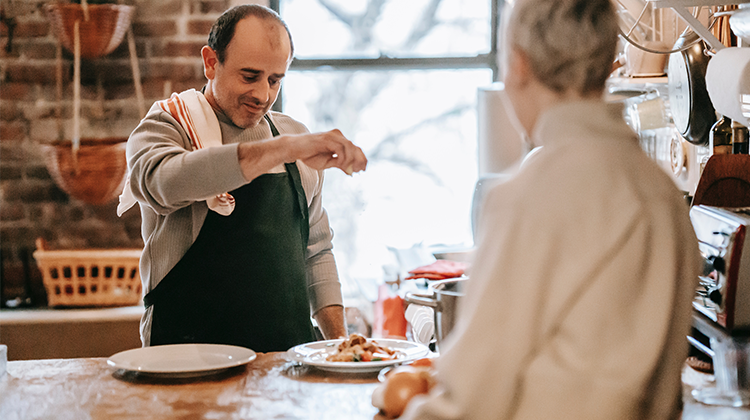All language learners probably have ever asked themselves “do these people actually speak elike the book’s dialogues?” Well, as you have probably found out, no, they don’t.
I still remember the first time I spoke with an American, and he asked me “how are you doing?” and I was like “is he actually interested in what I’m doing? What does he mean by how? The way I do something?”
One thing people ignore when they start their learning journey is that language books are made to let you learn a language through its structure and rules and understand how it’s made and how it works, but speaking a language is totally different.
When Italians speak, they express themselves not only with words but also with gestures (of course) and a lot of idioms! Idioms are short sentences and expressions whose meaning is not deducible from their literal translation.
So here 8 Italian idioms you probably didn’t know:
1) Conosco i miei polli - Lit. “I know my chickens”
Spoiler: we’re not actually talking about chickens. This expression stands for “I know what I’m talking about”. So we’re expecting exactly what we’re thinking of. For example:
Io so già in anticipo cosa faranno, cosa diranno, come si comporteranno, conosco i miei polli.
“I already know in advance what they’ll do, what they’ll say, how they’ll behave, I know who I’m dealing with”
2) Morto un papa, se ne fa un altro - Lit. “one pope dies, another one will be made”
I know, Italians have a thing for the Church, even if they don’t do it on purpose. We have many expressions that are referred to it and this is one of the most used. This one’s meaning is like “life goes on even after the worst of tragedies”, in a nutshell: “Oh no. Anyway.”
- “Io e Marco ci siamo lasciati, sono molto giù”
- “Dai, morto un papa se ne fa un altro!”
- “Marco and I broke up, I’m sad”.
- “Come on, life goes on!”
3) Ogni morte di papa - Lit. “Every death of a pope”
As I said, we have a thing for this stuff. Here’s another expression about the pope. Since the death of a pope doesn’t come very often (or at least, not usually) this depression refers to an event that occurs once after a long time. It’s also used sarcastically.
“Qui non nevica mai, forse una volta ogni morte di papa”
“It never snows here, maybe once blue moon”
4) Chi dorme non piglia pesci - Lit. “Who sleeps doesn’t catch fish”
This one is the English “the early bird catches the worm“, so basically, it means that if you’re lazy, you get nothing.
- Sono rimasto a casa a dormire e mi sono perso gli sconti in negozio!
- Eh, chi dorme non piglia pesci!
- I stayed home to sleep and missed the discounts in the store!
- Eh, the early bird catches the worm!
5) Avere le braccine corte - Lit. “To have short arms”
This expression is not referred to a physical condition, of course, it’s figurative and it’s used to say someone’s a bit tight with their money. It is translatable with the English expression “short arms and deep pockets”, referring to those people who have money but never put their hands in their pockets to pay for anything.
“Paolo non offre mai, ha le braccine corte! ”
“Paul never offers anything, he has short arms and deep pockets! ”
6) Tutto fa brodo - Lit. “Everything makes broth/soup”
Italians have a thing for food as well (of course), so we have many expressions that are food-related. Here’s one of the most used ones. This one can be translated with “every little bit helps”. A soup is good when you put a lot of ingredients in (good soup, I know you laughed), so everything contributes something to the whole.
- Non so se fare il corso di francese o quello di spagnolo.
- Falli tutti e due, tutto fa brodo!
- I don't know whether to take the French course or the Spanish one.
- Do them both, every little bit helps!
7) Minestra riscaldata - Lit. “Reheated soup”
Food. Again. This expression usually refers to relationships, mostly romantic ones, but it can also be referred to as friendship. It’s referred to something that has already gone wrong and that we are trying to make right one more time, but know it will go wrong once again.
- Io e Luca ci siamo rimessi insieme.
- Di nuovo? È la solita minestra riscaldata!
- Luca and I got back together.
- Again? There’s nothing new about it!
8) Stare a pennello - Lit. “Fit like a paintbrush”
This expression is often used for compliments, it means that the dress or whatever (it can also be referred to situations, events, and so on) fits you so perfectly that it looks like it’s been painted onto your body.
- Come mi sta questo vestito?
- Ti calza a pennello!
- How does this dress fit me?
- It fits you perfectly!
Did you know all these expressions? What’s your favorite?
Follow me for more!
A presto,
Federica







